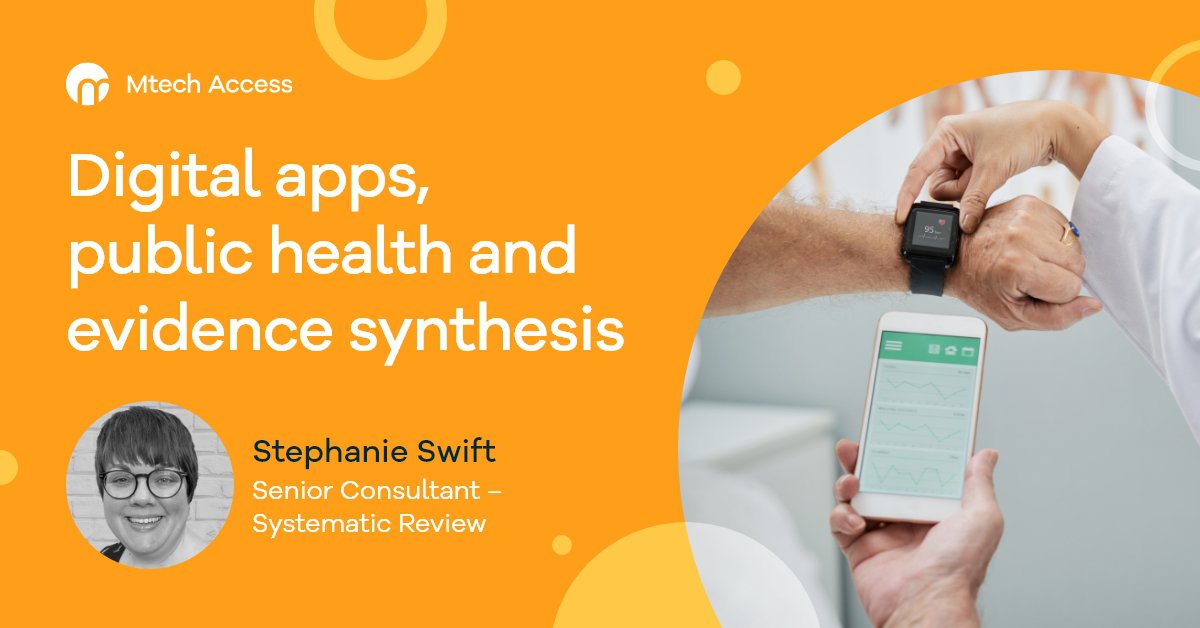
Stephanie Swift (Senior Consultant – Systematic Review, Mtech Access) selects her highlights from recently published literature and systematic reviews into the potential of digital apps to improve public health and integrate into evidence synthesis.
The average person has more than 80 apps on their mobile device, which are mostly used for maps, messages, music, photos, weather, games or social networking.
But digital apps aimed at putting you in control of your health are becoming increasingly popular.
More than 300,000 healthcare apps are now available to download worldwide. These collectively generate large volumes of data that can be mined to provide healthcare insights.
Leveraging this new evidence stream, several systematic reviews have recently been published on the use of digital apps and digital communications in the public health and healthcare space, for example:
- Zhang CY, Li H, Zhang S, et al. Abnormal uterine bleeding patterns determined through menstrual tracking among participants in the Apple Women’s Health Study. Am J Obstet Gynecol 2023;228:213.e1-22
- Eppes EV, Augustyn M, Gross SM, Vernon P, Caulfield LE, Paige DM
Engagement With and Acceptability of Digital Media Platforms for Use in Improving Health Behaviors Among Vulnerable Families: Systematic Review
J Med Internet Res 2023;25:e40934
These publications demonstrate how digital tech has the potential to transform everything from the patient experience, to how we collect and synthesis evidence, to population health management.
Transforming the patient experience
Digital technologies have the potential to give patients more power to manage their health conditions in their own way.
In 2022, a systematic review was published that assessed how frequently digital apps were used to manage chronic pain conditions, including pain related to fibromyalgia, cancer, osteoarthritis, menstruation and headache, among others. Chronic pain is a debilitating and lifelong issue with a significant public health impact. Any strategies that could help to manage this condition would be useful – especially if these were based in the patient’s own home and used their own existing device.
The study reported several interesting findings, and suggested that mobile app-based interventions may be better than web-based interventions or chatbots at reducing pain. Whilst this currently seems like an unusual research question for a medical systematic review, it is interesting to think that this could soon become a standard part of the evidence required by payers and a crucial part of a digital technology’s proposition.
The review also suggested that digital apps were a promising way to reduce pain intensity and improve associated depression and anxiety symptoms, although the study authors noted that further large clinical studies were needed to confirm these benefits.
Digital tech generates big data
The wide uptake of wearable technology, such as the Apple Watch, has rapidly created a huge global data stream that can be leveraged (with the user’s permission) for pharmaceutical, diagnostic and medtech applications.
A recent medtech study used data from 50,000 women as part of the Apple Women’s Health Study, run by Harvard T.H. Chan School of Public Health and the National Institute of Environmental Health Sciences (NIEHS). The study collected anonymised user data from the Apple Research app alongside user survey responses to help scientists understand menstrual cycles and gynaecological conditions such as the menopause, infertility and polycystic ovary syndrome, which are typically severely underfunded areas of research.
The results from this study, which were recently published in the American Journal of Obstetrics and Gynecology, provided new prevalence values for abnormal uterine bleeding, both across the general population and broken down by ethnicity.
The study also presented important data to support the development of new pharmaceutical interventions for women’s health.
The potential to use big data for evidence synthesis is really exciting, particularly in areas where a large proportion of the population are affected yet may not be directly accessing treatment.
Promoting healthy behaviours
Digital tech can also be used as an effective communication strategy to help promote healthy behaviours and reduce the public health burden of preventable diseases. A recent systematic review investigated the types of digital communication strategies used by community-facing organisations to promote positive behaviours. This included areas such as:
- Healthy pregnancies
- Breastfeeding
- Healthy diets
- Fruit and vegetable consumption
- Obesity prevention/healthy weights
- Increasing physical activity
- Vaccine use
- Disease prevention
- Stopping smoking
This study looked at three different types of digital media platforms, including texting, mobile apps and social media, and reported user engagement rates, which are an indicator of changes in health behaviours.
Based on 18 studies that measured the impact on one or more health behaviours, 83% of participants achieved at least one of their health behaviour objectives, and a third achieved all of their objectives.
A caveat of this study is that the studies it looked at were generally small and of low quality. However, it does show the potential of digital tech in the field of population health management.
Digital impacts on health
The use of digital apps, websites and chatbots that can gather individual user data (with consent) is poised to continue expanding in the healthcare space. These have a wide range of applications, from helping people stick with their healthy eating goals to providing robust evidence that can contribute to health technology appraisal (HTA) submissions.
Importantly, digital tech also has the potential to integrate into shared decision making in the healthcare setting, where patients, together with their doctors, make personalised decisions on how they want to manage their disease based on their personal preferences.
If you’d like to explore with our experts in systematic review how evidence synthesis techniques can support the value proposition and commercialisation strategy for your digital technology, please email info@mtechaccess.co.uk.


